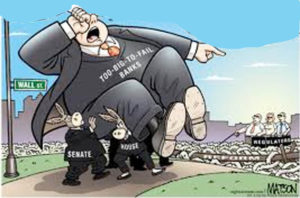 “If that be right which Warwick says is right
“If that be right which Warwick says is right
There is no wrong, but everything is right.”
(King Henry VI, part 3, act 2, sc. 2)
Comment. Few will disagree that these days it is increasingly difficult to make sense of banks and of the law (at least as banks are concerned). And while bankers amuse their leisure with the most generous gratifications they are in total control of the financial weather and live by an independent law.
About one week ago Attorney General Eric Holder admitted to a Senate committee that the Obama administration considered the major Wall Street banks too powerful to prosecute. Meaning that the probability of prosecution is in inverse proportion to the massiveness of the theft. More simply, too big to fail and too big to jail.
It should not be a surprise, therefore, the finding of a Senate Permanent Subcommittee on Investigations documenting, in a 300-page report, rampant fraud and law-breaking by JPMorgan Chase, the largest bank in the US and the world’s biggest dealer in derivatives.
The report states, “The Subcommittee’s investigation has determined that, over the course of the first quarter of 2012, JPMorgan Chase’s Chief Investment Office used its Synthetic Credit Portfolio (SCP) to engage in high risk derivatives trading; mismarked the SCP book to hide hundreds of millions of dollars of losses; disregarded multiple internal indicators of increasing risk; manipulated models; dodged OCC [Office of the Comptroller of the Currency] oversight; and misinformed investors, regulators, and the public about the nature of its risky derivatives trading.” Translated, the bank screwed its customers big time.
The dust of antique time is not yet so deep for not remembering when last year JP Morgan CEO Jamie Dimon testified, before an obsequious and almost reverential Congressional Panel, that the pitiful loss of 6 billion dollar plus was due to the misadventure and the myopia of the Synthetic Credit Portfolio (SCP) administrators. Translated, the money JPMorgan used to speculate on the credit status of various entities included the federally insured deposits of tens of thousands of customers.
Now then, according to written law, submitting false reports to federal regulators, deceiving investors and the public and concealing losses are crimes punishable by fines and jail time. Yet there have been no indictments of the bank or of Dimon or of any other top JPMorgan executives, let alone convictions or punishment.
I know of a small bank in Vancouver, Washington, where the director of the bank went to jail for having submitted a false report to federal regulators on the value of the bank’s real estate loans. Compared to the JP Morgan losses it’s the proverbial pittance.
But… here too the law of inverse proportion applies. In the most recent related Congressional Panel the CEO Dimon was not called to testify – a pretty good signal that he has nothing to fear. After all he is known as Obama’s “favorite banker” and was repeatedly invited to the White House during Obama’s first term.
Last year, shortly after Dimon’s announcement of previously concealed trading losses, Obama personally vouched for Dimon and his bank. He publicly declared that Dimon was “one of the smartest bankers we’ve got” and that JPMorgan was “one of the best managed banks there is.”
Apparently, JPMorgan is not the exception, it is the rule. At least according to another committee-issued 630-page report, documenting the illegal activities of major Wall Street banks in the run-up to the financial meltdown of September 2008. The report spelled out as well the complicity of federal regulatory agencies and the credit rating firms. According to the report, the investigation had found “a financial snake pit rife with greed, conflicts of interest and wrongdoing.”
Which would prompt the naïve citizen to say, “Good, what next?” The answer is ‘Nothing’. The financial malefactors, as widely known, have been rewarded with ever greater public funds to subsidize record profits and executive bonuses.
There are those who claim that all this is the result of decades of industrial decay and political reaction. Together they have promoted the unbridled rule of a financial aristocracy, which, like the aristocracies of old, is a law unto itself. It controls both parties and the entire political system and is not subject to the rules that bind mere mortals.
In Shakespeare’s terms, then,
“If that be right which the banks say is right,
There is no wrong, but everything is right.”
For the big banks, that is.
In the play. The Prince of Wales, rightful heir to the throne comments on Warwick’s reasons why Henry VI should abdicate (whereby the Prince of Wales would lose his rights).
Original Image Site: http://econintersect.com/wordpress/wp-content/uploads/2011/03/Fat-Banker.jpg
